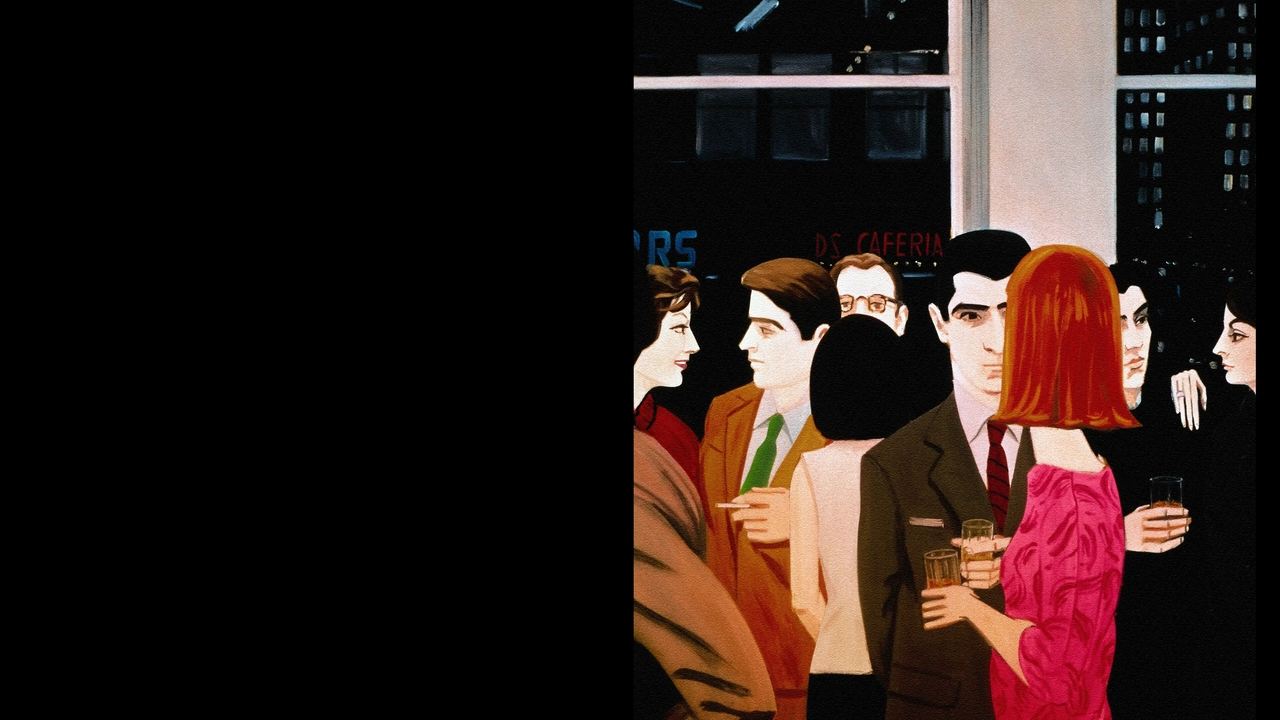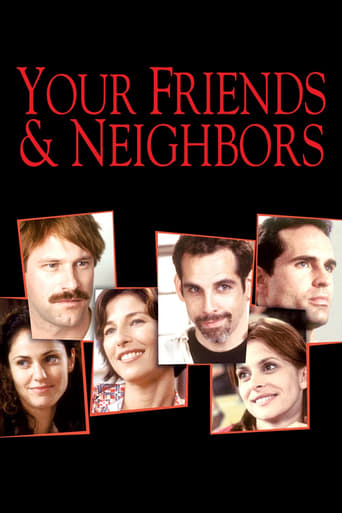

Boring, long, and too preachy.
... View MoreThe film makes a home in your brain and the only cure is to see it again.
... View MoreThis is a coming of age storyline that you've seen in one form or another for decades. It takes a truly unique voice to make yet another one worth watching.
... View MoreThe storyline feels a little thin and moth-eaten in parts but this sequel is plenty of fun.
... View MoreThis is one of those movies that wallows in the ordinary unhappiness and dysfunction of real life. Sometimes those stories can be entertaining, but this film is undone by pretension, an inability to figure out the most interesting elements of its own story and the inclusion of a character who belongs in a completely different movie.Amy Brennerman and Aaron Eckhart play a married couple. They're friends with Catherine Keener and Ben Stiller, who play a couple who live together. Jason Patric plays Eckhart's and Stiller's bachelor friend and Nastassja Kinski plays a museum assistant they all come into contact with. Brennerman's character is what people used to call "frigid", greatly frustrating her and her husband. Stiller's guy is an emotionally immature chatterbox who somehow ended up with Keener's angry woman that pushes away real intimacy because she's afraid of losing her individuality. Patric plays a narcissistic sociopath who turns into a human cartoon after a bizarre sauna confession that doesn't fit anything else in this movie. Eckhart is, I guess, supposed to be the relatively normal guy the audience can identify with but becomes strangely passive just when a normal person would start to get angry at the miserable things that happen to him. Kinski plays, well, just a needy lesbian.The pretension of this movie is pretty unmistakable. None of the characters are named throughout the film, but then in the credits they all have similar sounding names (Cary, Terri, Jerry, etc). Eckhart, Keener, Patric and Stiller all play the same exact scene with Kinski at different points. This is very much a film that wants to be thought of as clever, but you usually need to be clever to have people think that.The second problem is that the movie is largely focused on its men, when the most interesting characters are Brennerman and Keener. Brennerman is a basically decent woman who can't have a satisfying sexual experience and feels incomplete without it. You can see how the lack inhibits her and how the need energizes her. Keener is a woman who wants to be in a relationship but is desperate to not be part of a "couple". You can see it in how she keeps Stiller at a distance but is heartbroken when she learns of his unfaithfulness and you can see her repeating the same pattern with Kinski, wanting to be together but not wanting to be close. But the story doesn't spend enough time with them and both characters end up being not much more than their emotional problems.And even when the film focuses on its male characters, it gives short shrift to the most compelling facet of their relationships. The dynamic of Stiller and Eckhart living vicariously through Patric's sexual adventures and of Stiller playing the junior partner to the more masculine Eckhart and Patric is only alluded to. We don't get enough of the three of them together and too much of Patric and Stiller on their own.Patric's performance is also wildly misplaced. The movie imagines itself to be about what could be happening with the people who live next door but Patric is like the serial killer who lives down the block. He's hard and cold and sharp and looks like he was teleported in from an alternate dimension compared to the other characters.Keener and Brennerman are quite good and if Your Friends and Neighbors had been more about them, it might have been a worthwhile film. As it stands, I can only recommend it if you can't comprehend how Neil LaBute could go from making In The Company of Men to doing a remake of The Wicker Man. Your Friends and Neighbors might have convinced LaBute and Hollywood that his creative shtick really had nowhere else to go.
... View MoreIf you're a person (especially between 25 and 35), without emotional depth or without spiritual (not necessarily religious) inklings of something beyond yourself, you're morally adrift on a raft of tortuous narcissism. That's what this movie says. Not having emotional depth doesn't mean you don't feel things deeply; it means here you can't empathize with others. In fact the movie shows graphically that without the qualities and sensitivities we think make us most vulnerable, all we can be is mentally wounded, emotionally hurt, damaging to others. A more realistic, sensible portrait of narcissism and its discontents I've never seen. Everyone in this film is so focused on his or her self, nothing that could help can enter. Here is a world without anything transcendent, without even community through which to escape the prison of self absorption. Here is a take on contemporary America.
... View MoreCONTAINS SPOILERS THROUGHOUT The first time I saw this film, I came away not liking it. It was disturbing, heavy, and none of the characters were very likable. But through the years I have seen it a few more times, and it has grown on me considerably.I must be honest here-I saw it only because it had Jason Patric and Aaron Eckhart (two actors that I can truly say I became a fan of from seeing them in their earliest roles-Lost Boys for Patric and In The Company of Men for Eckhart), and they delivered on their performances. Patric's character is one of the most twisted and narcissistic characters in cinema history, but he brings a vulnerability and a likability to the screen, and it's hard to hate him. You want to know where he's coming from, and you get a glimpse after he describes a brutal sexual encounter in which he attacks a classmate, and then says it's the best sex he ever had. Even though it is an ensemble cast, Patric owns the film. Eckhart, in a 360 turn from his character in the aforementioned In The Company of Men, plays a nerdy, emotionally distant husband who can't enjoy sex with anyone but himself. Amy Brenneman, as a neglected housewife who has an (almost) affair with Ben Stiller's character does a good job, but you never see it coming when she ends up with Patric, and it makes no sense. The always brilliant Catherine Keener puts in another deadpan performance, this time as the bitchy artist type who decides she prefers a woman (the luminous Nastasja Kinski) over Stiller. She does get hers in the end, after she snottily rejects Patric's character and he puts her in her place. Ben Stiller, who most of the time annoys me with his constant mugging and nervous jittery energy, fits in well with the cast, and you end up feeling sorry for his character. He means well, he just seeks out the wrong women.The movie is talky, but the conversations are riveting. You want to hear more, and learn more about what makes these characters tick. Overall, I give the movie an 8 out of 10.
... View More"Your Friends and Neighbors" (1998) is the second film by director/writer Neil LaBute and it tells the story of three couples and their complicated friendships and relationships. I've seen it more than once during the last couple of days - and I found it incredibly clever written, well acted (especially by Jason Patric and Catherine Keener - their only scene together was the second best in the movie - so dynamic and tight) and skillfully directed. LaBute certainly has a very unique sense of humor and he knows well the history of cinema. To give all characters the names that rhyme - Mary, Barry, Terri, Cheri, Cary and Jerry - was a clever idea - the characters are interchangeable in their relationships and it does not matter really, who is with whom - Mary with Barry or with Cary or Jerry or Barry with Barry, and Cheri with Terri or Jerry? The important thing is that they are selfish and often unpleasant and despicable people who are not happy with themselves and can't make happy their spouses or partners. Another interesting trick - the repeating scene in the Art gallery that starts with exactly the same words for each character but leads to different developments. I mentioned that LaBute knows his movies. Have you noticed the poster from Goddard's Le Mépris, (1963) aka "Contempt" with Brigitte Bardot? "Contempt" features one of the most fascinating and longest scenes of a breakup ever filmed. The breakup scene between Terri (Catherine Keener) and Jerry (Ben Stiller) started like in "Contempt" but it only lasted a few minutes and it was a good scene. Actually, I loved all scenes with Catherine Keener and if I have to choose one character that I liked, it would be Terry. Seems that Charlie Kaufman might have seen LaBute's movie because Terry and Maxine from "Being John Malkovich" have a lot in common. I was actually waiting for Terry to say to Jerry, "The thing is if you ever get me, you would not know what to do with me". Jason Patric was a revelation - I don't know him very well but I remember that he gave a very good performance in "Narc". As for the scene in a steam room, it is not just the best of the film; it is one of the best scenes - monologues ever. I know not many would agree with me but the scene is as powerful, unforgettable and strangely erotic as the monologue in Bergman's "Persona". LaBute's writing, his camera, and mesmerizing performance by Patric made this scene an instant classic. The film is not perfect and sometimes it drags but overall I found it interesting and enjoyable. You don't have to like the characters in order to like and appreciate the film. Sadly, the beautiful, sensual and talented Nastassja Kinski (Cherri) does not have much to play while Ben Stiller does and I am not his fan - even in this film. LaBute's usage of "Metallica"s "Enter Sandman" (performed by Apocalyptica) during the opening and the closing credits instantly pulled me in and Bryony Atkinson's song "My Hollow" is terrific.
... View More